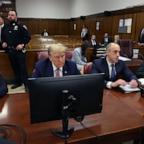Obama Vs. Romney: Will October Bring a Political Surprise?
As election comes to a close, unexpected events can change everything
Oct. 1, 2012 — -- Imagine the impact on the polls if just days before Election Day, negotiations between the president and Iran dramatically broke down, intensifying an already volatile situation and fueling rumors that his Republican challenger cut a deal with a hostile enemy power to influence the election.
Would you be surprised?
Maybe not, if you remember what happened on the eve of the election in 1980. In that year, negotiations between President Jimmy Carter and Iran over the release of 52 American hostages collapsed on the Sunday before Election Day.
Over the next 72 hours, Carter, who had been trailing Republican challenger Ronald Reagan by two points, dropped 10 points behind, and the "October surprise," a game-changing incident in the final days of the campaign, became firmly rooted in our political consciousness.
"You can term any unexpected event in late October or early November an 'October surprise,'" said Larry Sabato, director of the Center for Politics at the University of Virginia. "The surprising thing is that we're surprised by it every four years."
The drama of a potential October surprise comes as much with the ticking of the clock toward Election Day as it does with the shrinking of the electoral map. A tight race like this year's, where the candidates are separated by a few points in battleground states, increases the likelihood that an unexpected event can shape the polls.
As in 1980, conflict with Iran looms over the race. Last week, Israeli Prime Minister Benjamin Netanyahu told the United Nations Iran might have a nuclear weapon by summer.
For months, the threat that Israel could unilaterally strike Iran's nuclear facilities has been on the table. Would Iran react by attacking American interests? Were something to occur in the days before the election, it's impossible to know how it might affect the voting.
In 2004, a foreign surprise apparently moved the needle in a tight race, helping George W. Bush squeeze past Sen. John Kerry in the final days of the campaign.
Three years after 9/11, terrorism remained the number one issue in voters' minds that year, and Osama bin Laden released an audio tape the last week in October in which he said, "Any state that does not mess with our security has naturally guaranteed its own security."
On Oct. 31, 2004, the polls put Bush and Kerry in a dead heat. A week later, Bush won the election by 2.5 percent of the popular vote.
Sometimes October surprises are the result of outside factors, like the bin Laden tape, but they are often the result of planned tactics by the campaigns.
In 2000, the Bush campaign was confronted with a surprise, though it did not actually occur until Nov. 2.
Five days before the 2000 election, Bush admitted to a 1976 arrest for drunk driving near his family's summer home in Kennebunkport, Maine.
"The 2000 announcement didn't cost Bush the election, but it certainly cost him the margin. It could not have gotten any closer than it did," presidential historian Richard Norton Smith told ABC News in an interview later.
Whether the Obama and Romney campaigns are holding on to information, waiting to spring it at the last minute, remains a mystery. But there are secrets each campaign wants out in the open, including a decades' worth of Romney's tax returns and Obama's college transcripts.
Moreover, the economy remains volatile and Romney and Obama have yet to square off face-to-face in a debate.
The release of new economic indicators, depending on what they show, could help either candidate gain a few points.
Televised debates in the final days of the campaigns in 1960, between John F. Kennedy and Richard Nixon, and in 1980 between Reagan and Carter, helped Kennedy and Reagan respectively.
"Regan nailed it in those debates," said Smith.
Obama is considered the better debater, but f Romney were to perform unexpectedly well that could shake up the race.




